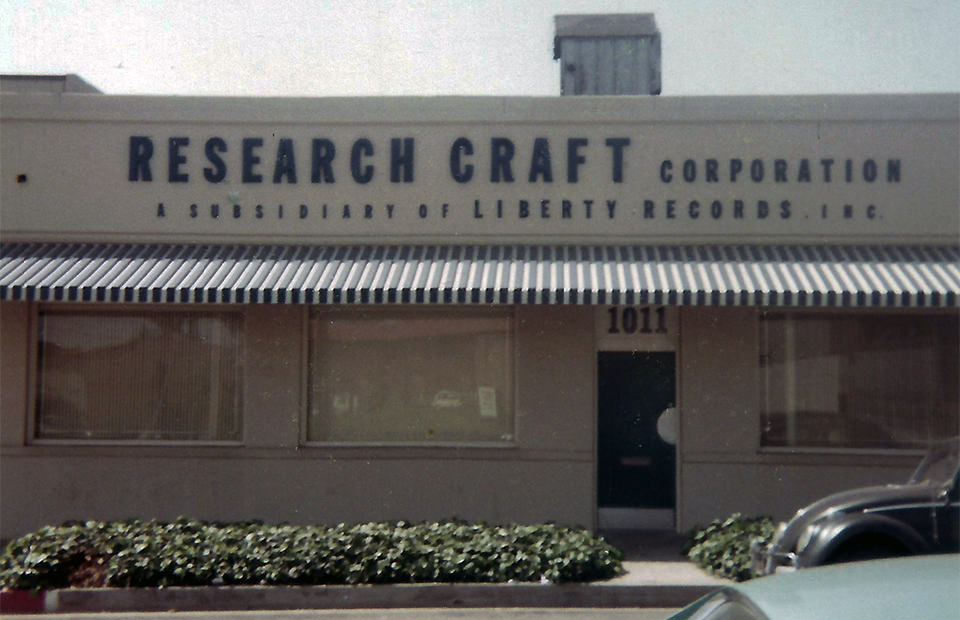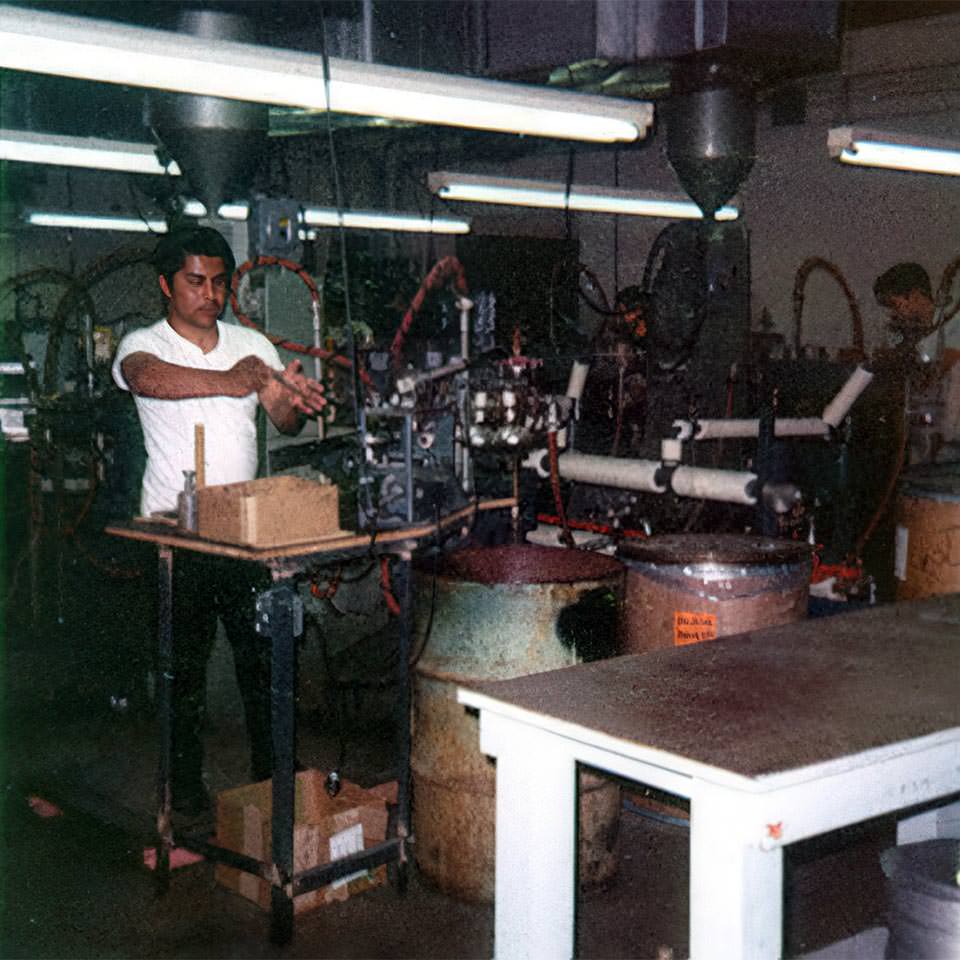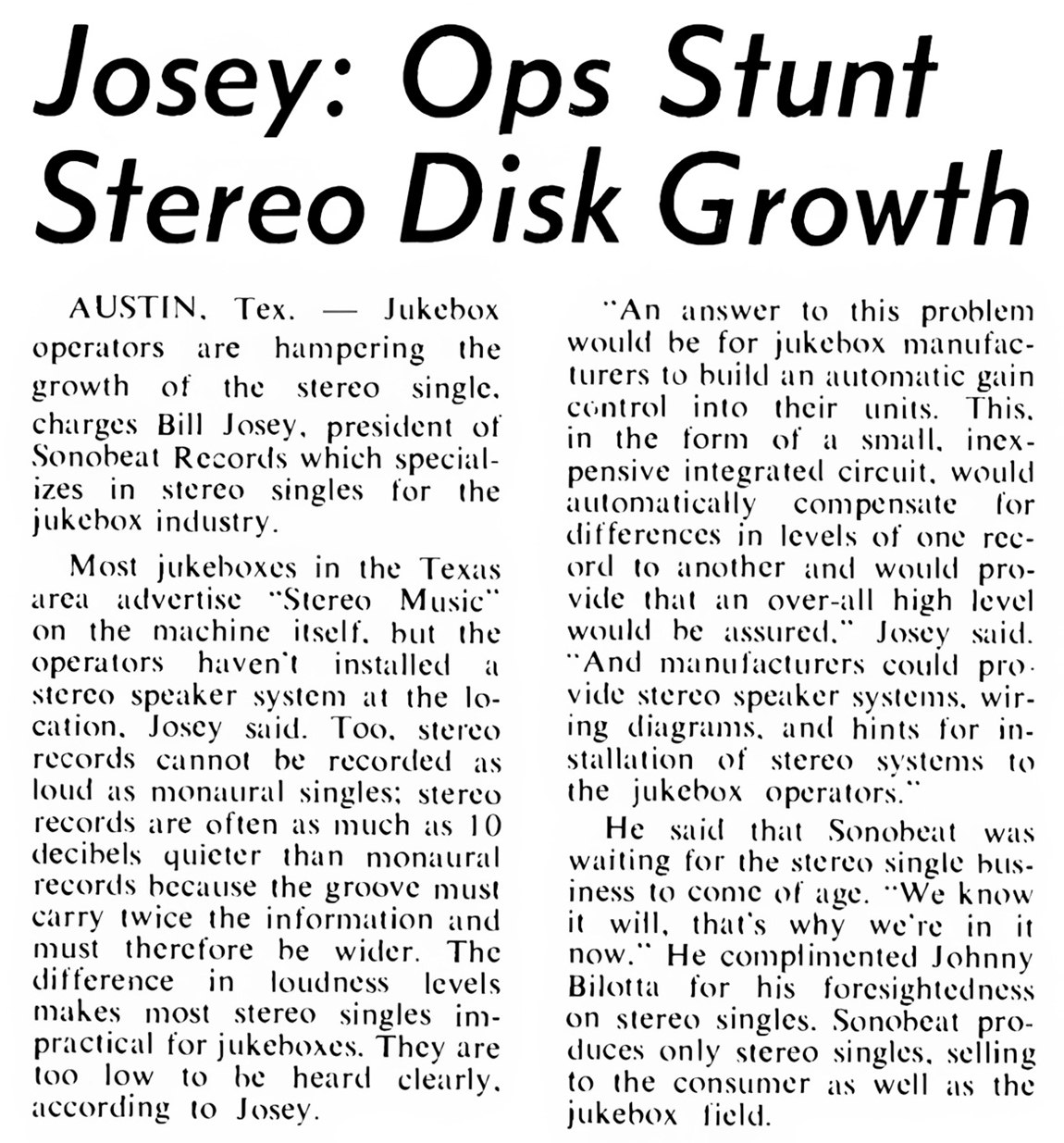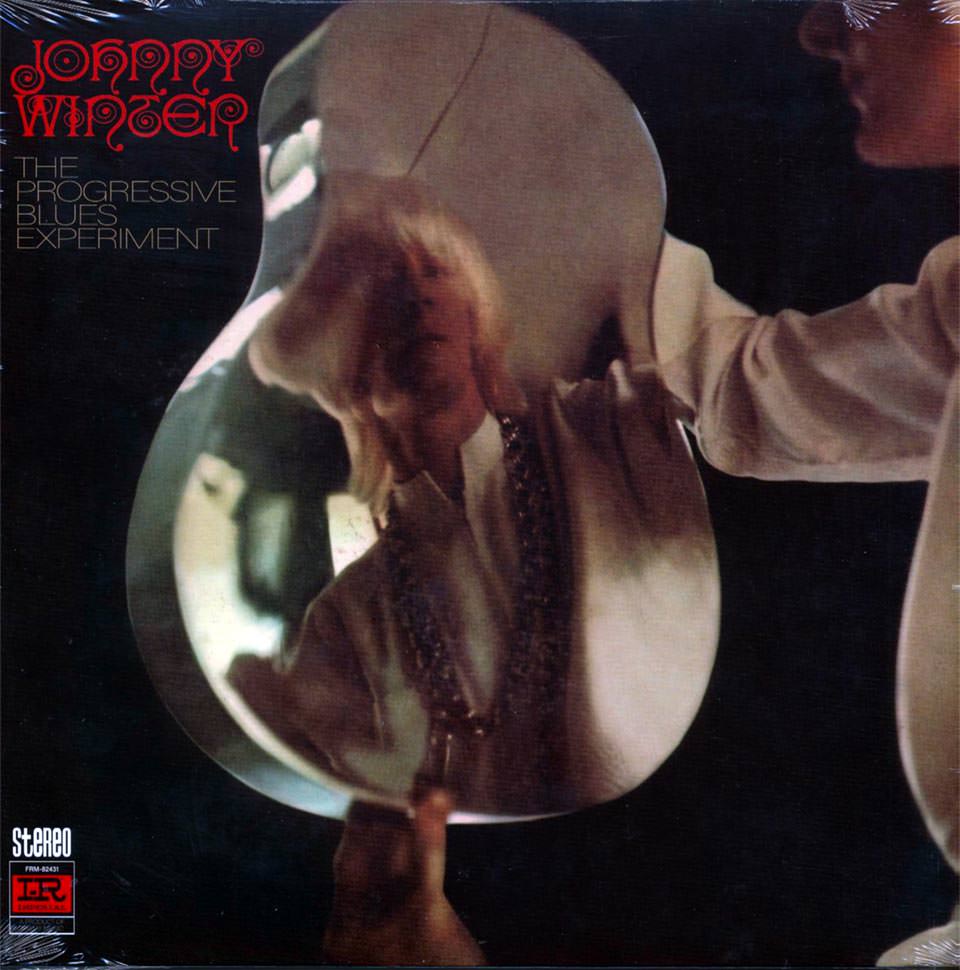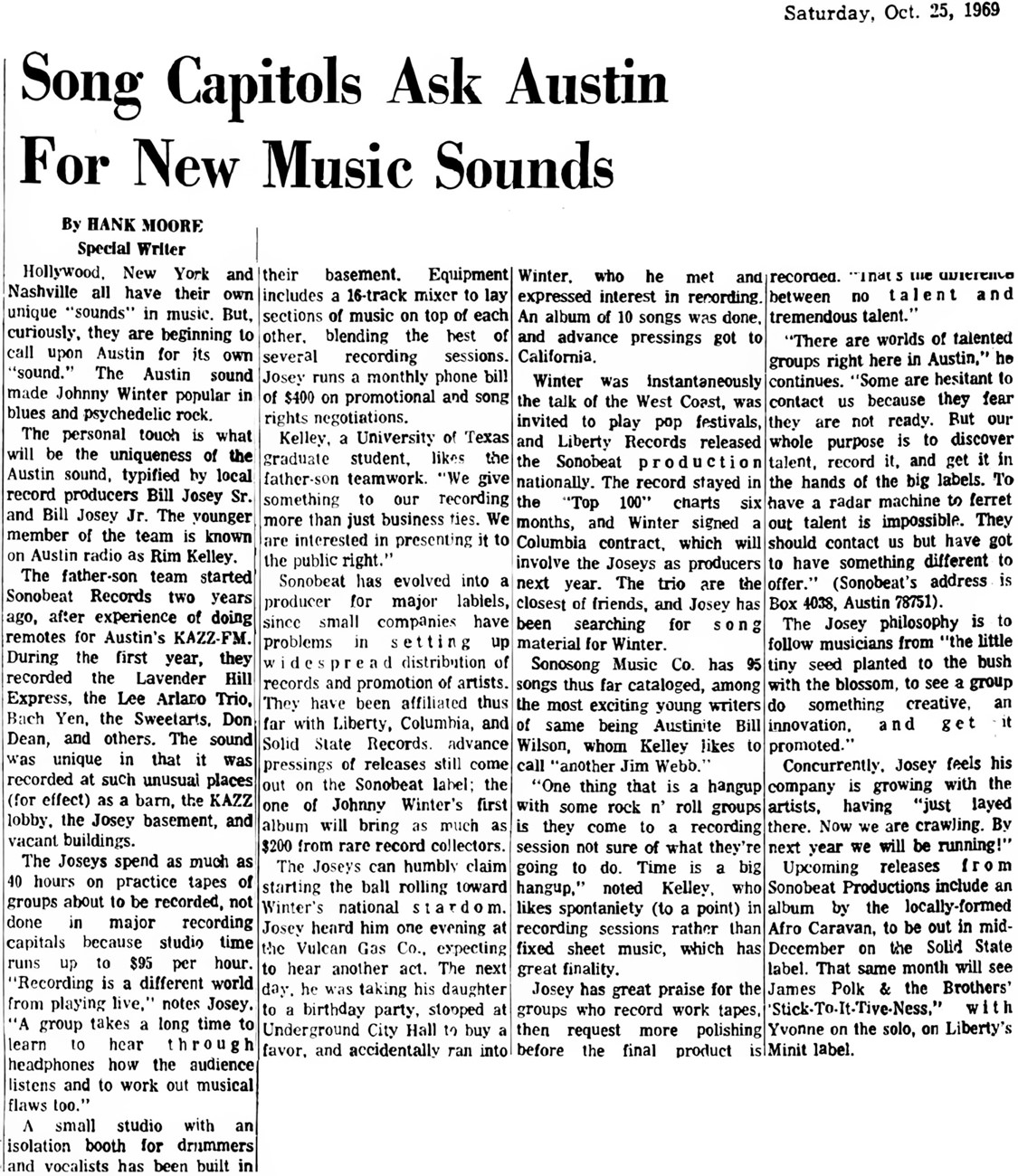
The story of Austin’s Sonobeat Recording Company, Sonobeat Records, and Sonosong Music
1969: Running in Place
Sonobeat History
1969
Starting the year with a visit to Los Angeles
Back in December 1968, Liberty Records, based in Los Angeles, California, began negotiations with Sonobeat to acquire rights to Sonobeat’s Johnny Winter album, The Progressive Blues Experiment. In mid-January, Sonobeat co-founder and Winter album co-producer Bill Josey Sr. drove the Josey family from Sonobeat’s home base in Austin, Texas, to Los Angeles. The purpose of the cross-country trip was to hand deliver The Progressive Blues Experiment master tapes to Liberty general manager Bud Dain and national sales director Eli Bird. The master tape delivery completed the deal Sonobeat had just struck to sell the Winter album to Liberty for release on its Imperial Records label.
While in Los Angeles, the Joseys toured a handful of recording studios, including Liberty Recorders and United Western Studios, both on Sunset Boulevard in Hollywood, Wally Heider Recording (although Heider’s most famous studio was in San Francisco, his LA-based studio also was famous) on Cahuenga Boulevard in Hollywood (where the Joseys sat in on a recording session with drummer Sandy Nelson), and the up-and-coming Elektra Sound Recorders on La Cienega Boulevard in West Hollywood. They also visited Liberty’s newly-acquired west coast record pressing plant, Research Craft, on North Fuller in Los Angeles. The trip was an eye-opener for the Joseys, since this was the first time they’d seen firsthand the inner workings of major recording studios. They considered the trip a great success, returning to Austin with a substantial advance against future royalties from the sale of the Winter album. They also returned with new ideas for the future growth of Sonobeat. The Joseys stopped on the drive back to Austin to visit the Sidney J. Wakefield & Company record pressing plant in Phoenix, Arizona, where Sonobeat’s vinyl single and album releases were mastered and pressed.
Just before leaving for Los Angeles, Bill Sr. gave an interview to Billboard, the weekly music industry trade journal. Billboard editors had heard that Liberty Records was negotiating for Johnny Winter’s album and were curious about Sonobeat, a small record company in Austin, so they reached out to Bill Sr. One of Bill’s pet projects for Sonobeat had been to foster relationships with jukebox record distributors in Texas because they bought hundreds of copies of individual singles, but in the Billboard interview, published in the January 25th issue, he criticized jukebox operators’ slowness to embrace stereo singles. Sonobeat released its singles only in stereo versions and needed the jukebox industry’s support.
A pared-back release schedule
Coming into 1969, Sonobeat had just invested considerable resources for the tiny company’s aggressive 1968 release schedule and expansion – putting thousands of dollars into new recording and mixing equipment and outfitting a home-based studio. The advance from the sale of the Winter album to Liberty Records helped pay off some of Sonobeat’s larger equipment purchases. But the Joseys already had anticipated they would have to scale back in 1969. Sonobeat’s pared-down 1969 release schedule included 45 RPM singles by James Polk and the Brothers, Plymouth Rock, Vince Mariani (who recorded Sonobeat’s only drum solo release), and the Lee Arlano Trio (Sonobeat’s second and final Arlano single), and non-commercial demo albums for Sonosong composersHerman Nelson and Bill Wilson.
Although Sonobeat issued fewer releases in ’69 than in ’68, that was because the Joseys focused on building the label’s next “super group” to replace their 1967-’68 star group Lavender Hill Express following its breakup. And that next “super group” was built around Vince Mariani, with the group’s members hand-picked by producer Bill Josey Sr. Sonobeat also recorded unreleased material with nationally-famous bubblegum group Ohio Express (who were trying to make a major musical direction change), Cody Hubach, Georgetown Medical Band, and Contraband. With the addition of a precise audio oscillator, Sonobeat’s two half-inch 4-track tape decks could be sync-locked to form a virtual 8-track recorder, making complex sessions and layered overdubs much easier. The purchase of more and better microphones in 1968, including a matched pair of Sony ECM-22 electret condenser mikes that cost $100 each (or a little over $900 each in 2025 dollars), eliminated the need to tap“Tapping” is a method used to record an amplified instrument, such as an electric guitar, without placing a microphone in front of its speaker box and is accomplished by attaching one end of an audio cable to the speaker box input from the amp (using alligator clips) and the other end to a line input of the audio mixer. This meaning of “tapping” is unrelated to the fret finger tapping technique of playing a guitar. electric instruments at their amps, but Bill Jr. still preferred tapping as well as plugging some instruments, such as bass guitar, directly into Sonobeat’s custom mixing console and designed and built attenuator boxes that bridged the tapped instrument and the mixing console to prevent input circuit overload.
Sonobeat’s first national release
In March, Liberty released Sonobeat’s Johnny Winter album, The Progressive Blues Experiment, on the Imperial Records label. Also in March, Sonobeat Recording Company and Sonosong Music Company formally incorporated in the State of Texas and ceased operating as partnerships between Bill Sr. and Bill Jr. Bill Sr. assumed the role of president and Bill Jr., the role of vice president and A&RArtist & Repertoire (A&R) executives at record labels recruit and manage a roster of artists, connecting them to new songs and overseeing their recording and promotional activities. director.
New remote recording location
Because Sonobeat’s Western Hills Drive studio in the Joseys’ home was in a quiet northwest Austin residential neighborhood where loud nighttime recording sessions weren’t tolerated, the Joseys began using the auditorium at the First Cumberland Presbyterian Church, where they were longtime members, to record rock groups. The church auditorium housed a full-size basketball court, and, because of its high ceiling, offered good recording acoustics. To protect the basketball court floor, the Joseys rolled out area rugs for amps, speaker boxes, and recording equipment. The church auditorium was available almost every weekday and on weekend evenings, making it an attractive remote recording facility. As a bonus, it was a short drive from the Western Hills Drive home-based studio. The first groups Sonobeat recorded at the church auditorium were Plymouth Rock and New Atlantis.
Rounding out the year
On October 25th, the Austin American-Statesman newspaper ran an article about Sonobeat entitled Song Capitols Ask Austin for New Music Sounds. Though the article contained several factual errors – for example, it claimed that some Sonobeat recordings were made in a barn (none were ever recorded in a barn), that Bill Jr. was a graduate student at the University of Texas (he wasn’t; he was an undergrad at the time), that Sonobeat had a relationship with Columbia Records to produce Johnny Winter’s future albums (Sonobeat didn’t), and that James Polk’s single Stick-To-It-Tive-Ness would be released on Liberty’s Minit label (it wasn’t) – it got most of the essentials right.
Near the end of the year, Liberty Records (which earlier in 1969 was purchased by Transamerica Corporation and merged with Transamerica’s United Artists record label to form Liberty/UA) made its second purchase from Sonobeat: Wali and the Afro-Caravan’s Afro-jazz album, Home Lost and Found (The Natural Sound), that Sonobeat recorded a year earlier. Liberty/UA released the album on its Solid StateSolid State was founded in 1966 by producers Sonny Lester and Phil Ramone and focused on releases by jazz artists, including Herbie Mann, Charles Mingus, Dizzy Gillespie, and Chick Corea, placing Wali and the Afro-Caravan’s album in good company. Solid State’s catalog was folded into UA’s Blue Note label in the late ’70s. label. The sale of the Afro-Caravan album to Liberty/UA was a financial godsend that helped Sonobeat press on in the coming years.
Sonobeat’s 1969 commercial releases
- Johnny Winter • The Progressive Blues Experiment • Imperial LP-12431
- Plymouth Rock • Memorandum backed with Just a Start • R-s114
- James Polk and the Brothers • Stick-To-It-Tive-Ness backed with The Robot • R-s115
- Vince Mariani • Pulsar backed with Boots • R-s116
- Lee Arlano Trio • School Daze backed with Meditation • PJ-s116
Sonobeat’s 1969 non-commercial song demo releases
- Herman Nelson • Songs from the Catalog of Sonosong Music Company: Herman Nelson, Composer • HEC-285M/HEC-286M
- Bill Wilson • Songs from the Catalog of Sonosong Music Company: Bill Wilson, Composer • WEJ-285M/WEJ-286M

